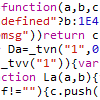 Welcome to 2012! Once again, I’ve been remiss in keeping this blog updated, but I’ll try to do better this year. Remember you can always follow the latest from my Fatal Exception blog for InfoWorld in the box to the right!
Welcome to 2012! Once again, I’ve been remiss in keeping this blog updated, but I’ll try to do better this year. Remember you can always follow the latest from my Fatal Exception blog for InfoWorld in the box to the right!
My first feature article of the year is another piece for InfoWorld. This time, I’m looking at up-and-coming programming languages. You’ve heard of C, Java, Python, Ruby, and maybe even Haskell, OCaml, and Scala … but have you ever heard of Zimbu, Fantom, Chapel, or haXe? Probably not — but you may, soon. Some people say we already have more than enough programming languages. Others say the computing field is changing so rapidly that the same old languages can’t move fast enough, and the only way for developers to gain the agility they need is to start over from scratch. In this feature, I look at ten experimental programming languages, why they were invented, where you can get them, and why they matter.

 With the rise of HTML5, a lot of folks wonder whether it might displace plug-ins such as Adobe Flash for rich Internet Application development. Adobe doesn’t see it quite that way. It sees the two technologies as complementary, and it’s putting its money where its mouth is. Adobe Edge is a new technology from Adobe Labs that aims to make it as easy to build complex animations in HTML5, CSS, and JavaScript as it is to do the same in Flash. It’s still rough around the edges, but it does make it possible to do some pretty remarkable things, especially if your goal is to develop banner ads, infographics, or other short animated sequences to be embedded in Web pages. Read on for more of
With the rise of HTML5, a lot of folks wonder whether it might displace plug-ins such as Adobe Flash for rich Internet Application development. Adobe doesn’t see it quite that way. It sees the two technologies as complementary, and it’s putting its money where its mouth is. Adobe Edge is a new technology from Adobe Labs that aims to make it as easy to build complex animations in HTML5, CSS, and JavaScript as it is to do the same in Flash. It’s still rough around the edges, but it does make it possible to do some pretty remarkable things, especially if your goal is to develop banner ads, infographics, or other short animated sequences to be embedded in Web pages. Read on for more of  Seven years after its IPO, Google is entering the next phase of its growth as a company. It’s impressively large by anyone’s standards, with $29.3 billion in revenue in 2010, nearly 30,000 full-time employees, and offices in 42 countries. And yet Larry Page, now Google’s CEO for the first time since 2001, still seems to view the company as a cross between a startup and his old Stanford University grad project. It’s neither, and it faces difficult challenges. The legal environment around Google is tightening even as it goes head-to-head with the industry’s largest companies, and the changes it must make to remain competitive may mean tomorrow’s Google little resembles the fun-loving Silicon Valley darling of yesteryear. Read on for the rest of my analysis of
Seven years after its IPO, Google is entering the next phase of its growth as a company. It’s impressively large by anyone’s standards, with $29.3 billion in revenue in 2010, nearly 30,000 full-time employees, and offices in 42 countries. And yet Larry Page, now Google’s CEO for the first time since 2001, still seems to view the company as a cross between a startup and his old Stanford University grad project. It’s neither, and it faces difficult challenges. The legal environment around Google is tightening even as it goes head-to-head with the industry’s largest companies, and the changes it must make to remain competitive may mean tomorrow’s Google little resembles the fun-loving Silicon Valley darling of yesteryear. Read on for the rest of my analysis of  One of Google’s many big ideas is Chrome OS, an operating system that essentially is a Web browser — nothing less, but nothing more. A Chrome OS computer, called a Chromebook, can’t install any software and it has very limited processing power and onboard storage. All the applications you use on a Chromebook are running “in the cloud,” which is to say they’re Web apps. Acer and Samsung are now shipping Chromebooks, and I recently spent some time working with Samsung’s latest model to see whether it has a place within my normal computing workday. The results weren’t particularly encouraging, unfortunately, though I think a Chromebook can be useful as a secondary way to access the Web around the home or office. Click through to InfoWorld.com to read
One of Google’s many big ideas is Chrome OS, an operating system that essentially is a Web browser — nothing less, but nothing more. A Chrome OS computer, called a Chromebook, can’t install any software and it has very limited processing power and onboard storage. All the applications you use on a Chromebook are running “in the cloud,” which is to say they’re Web apps. Acer and Samsung are now shipping Chromebooks, and I recently spent some time working with Samsung’s latest model to see whether it has a place within my normal computing workday. The results weren’t particularly encouraging, unfortunately, though I think a Chromebook can be useful as a secondary way to access the Web around the home or office. Click through to InfoWorld.com to read  In 2007, venture capitalist Paul Graham declared “
In 2007, venture capitalist Paul Graham declared “
